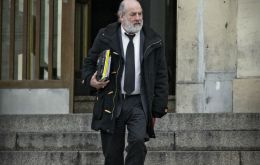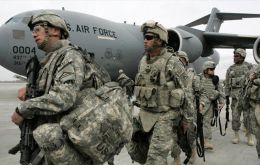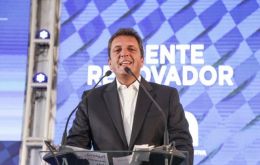MercoPress. South Atlantic News Agency
Tag: CFK
-
Friday, November 18th 2022 - 19:22 UTC
CFK says she can get Argentina back up but does not announce her candidacy

Despite not admitting explicitly whether she would run for president next year, Vice President Cristina Fernández de Kirchner underlined Thursday in La Plata that the people of Argentina must choose “if they want to return to make that Argentina they once had”.
-
Thursday, September 15th 2022 - 08:37 UTC
Fourth suspect arrested in connection with CFK case

Argentine authorities have arrested a fourth suspect in connection with the Sept. 1 assassination attempt against Vice President Cristina Fernández de Kirchner (CFK), it was reported Wednesday in Buenos Aires.
-
Wednesday, March 9th 2022 - 10:44 UTC
Argentine president Alberto Fernandez hints at a possible reelection

Argentine president Alberto Fernandez admitted on Tuesday the possibility of bidding for reelection next year, during a political rally celebrating the International Workers Women Day held in the stronghold of a Buenos Aires province powerful leader, Mario Ishi,
-
Tuesday, February 4th 2020 - 17:48 UTC
The Argentine judge who prosecuted vice president Cristina Fernandez de Kirchner is dead

Argentine federal judge Claudio Bonadio, notorious for bringing cases involving the former president and current vice president Cristina Fernández de Kirchner (CFK), died Tuesday morning at his home it was reported.
-
Monday, February 3rd 2020 - 07:59 UTC
Despite the rhetoric, Argentina close military collaboration with the US and Brazil

Last week the Argentine lower house of Congress, voted 214–2 to allow the “entry of foreign troops” and the participation of Argentine troops in exercises abroad. Several of the military exercises listed in the bill are being organized and financed by the Pentagon.
-
Saturday, January 18th 2020 - 08:48 UTC
Cristina Fernandez again considered the most influential Argentine

After eight years in office, back in 2015, when ex-president Cristina Fernandez left office, she ranked ninth among the most influential Argentines, according to an ongoing national opinion poll from Giacobbe & Associates which was started in the nineties.
-
Tuesday, December 10th 2019 - 11:30 UTC
Peronism is back in Argentina: Alberto Fernández assumes as President

Peronism will return to power in Argentina from Tuesday. The political force will do it in the hands of the elected President, Alberto Fernández, who will go to the Casa Rosada, the presidential headquarters, at noon after presenting the oath in the Congress to the outgoing vice president, Gabriela Michetti
-
Tuesday, July 9th 2019 - 09:55 UTC
President Macri's reelection chances improving according to leading pollster

President Mauricio Macri’s chances of winning Argentina’s election this year are improving as public sentiment climbs and the economy begins to find its footing after a currency crisis, according to Alejandro Catterberg, director of Poliarquia, one of the nation’s top pollsters.
-
Monday, June 24th 2019 - 09:50 UTC
Argentina lines up for the August primaries; three leading presidential tickets

Months of intense political negotiations and last minute nerve breaking deals came to an end in Argentina on Sunday's zero hour deadline, when the different political groupings had to present to electoral authorities their list of presidential hopefuls, as well as future lawmakers.
-
Wednesday, June 19th 2019 - 09:59 UTC
Argentine political scenario prepares for the October presidential election

Argentine politician Sergio Massa, who recently pledged his support to the main opposition challengers to President Mauricio Macri, is in line to play a key role in the country's Congress if his new allies win national elections later this year.
